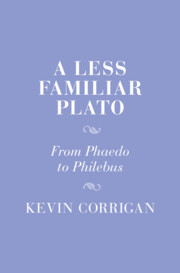Book contents
- A Less Familiar Plato
- Cambridge Studies in Religion and Platonism
- A Less Familiar Plato
- Copyright page
- Contents
- Acknowledgments
- Abbreviations
- Introduction
- Part I Embodiment and Participation in the Divine
- Part II Introduction to the Republic and Philebus
- Part III Introduction to Love, Myth, Erotikē Technē, and Generative Epistēmē
- 7 Love and Myth
- 8 Desire, Love, and Friendship
- 9 The Many Questions of Plato’s Phaedrus
- 10 General Conclusion
- Appendix Scientific Perception or Sharp Seeing in the Middle and Late Dialogues
- Primary Texts
- General Bibliography
- Index
7 - Love and Myth
Symposium, Republic, and Phaedrus
from Part III - Introduction to Love, Myth, Erotikē Technē, and Generative Epistēmē
Published online by Cambridge University Press: 26 October 2023
- A Less Familiar Plato
- Cambridge Studies in Religion and Platonism
- A Less Familiar Plato
- Copyright page
- Contents
- Acknowledgments
- Abbreviations
- Introduction
- Part I Embodiment and Participation in the Divine
- Part II Introduction to the Republic and Philebus
- Part III Introduction to Love, Myth, Erotikē Technē, and Generative Epistēmē
- 7 Love and Myth
- 8 Desire, Love, and Friendship
- 9 The Many Questions of Plato’s Phaedrus
- 10 General Conclusion
- Appendix Scientific Perception or Sharp Seeing in the Middle and Late Dialogues
- Primary Texts
- General Bibliography
- Index
Summary
The nature of love and the role of myth in Plato’s dialogues are, to put it mildly, highly contested issues. Platonic love has been characterized in many ways: as the spiritual love of ideal forms, far removed from mundane concerns;1 as a kind of Freudian sublimation of physical drives;2 as a search for wholeness in our divided constitution, much as Aristophanes represents this in the Symposium;3 as characterized by Diotima-Socrates’ speech in the Symposium, particularly in terms of the “greater mysteries” or ladder of ascent;4 or, again, as represented by Socrates’ second speech in the Phaedrus, namely, the great myth of the soul that has captured the imaginations of so many different generations over nearly two and a half thousand years, or as represented in parts of that speech, love as divine madness, for instance;5 or, yet again, as manifesting something like Pausanias’ distinction between a heavenly and a vulgar love, according to which the heavenly lover strives for wisdom and virtue at all costs, an aspiration that seems to resemble the Platonic thirst for spiritual wisdom.6 I will return to this question and to the vocabulary of love after establishing some basis for understanding the logos-myth distinction.
- Type
- Chapter
- Information
- A Less Familiar PlatoFrom Phaedo to Philebus, pp. 199 - 221Publisher: Cambridge University PressPrint publication year: 2023

